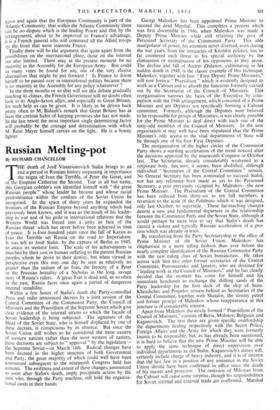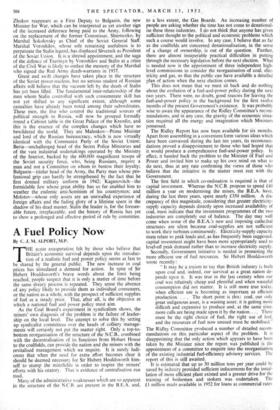Russian Melting-pot
By RICHARD CHANCELLOR THE death of Josif Vissarionovitch Stalin brings to an end a period in Russian history surpassing in importance the reigns of Ivan the Terrible, of Peter the Great, and of the Empress Catherine the Second. Tsar in all but name, this Georgian cobbler's son identified himself with "the great Russian people" whose leader he became and whose racial predominance within the confines of the Soviet Union he recognised. In the space of thirty years he expanded the frontiers of the Russian Empire beyond anything which had previously been known., and it was as the result of his leader- ship in war- and of his guile in international relations that the Western World was forced into a unity in face of the Russian threat which has never before been achieved in time of peace. It is four hundred years since the fall of Kazan to Ivan the Terrible set Russia on the road to Imperialism. It was left to Josif Stalin, by the capture of Berlin in 1945, to attain its western limit. The scale of his achievements is matched by their cost in human suffering to the patient Russian peoples whorl' he drove to their destiny, but when viewed in perspective even this may one day be seen as relatively no greater than the sadism of an Ivan, the ferocity of a Peter or the Prussian brutality of a Nicholas in the long, savage story of Russia's rulers. A great Tsar is dead and, as so often in the past, Russia faces once again a period of dangerous internal instability. Within a few hours of Stalin's death the Party-controlled Press and radio announced decrees by a joint session of the Central Committee of the Communist Party, the Council of Ministers and the-Praesidium of the Supreme Soviet which give clear evidence of the internal strains to which the façade of Soviet leadership is being subjected. The signature of the Head of the Soviet State, who is himself displaced by one of these decrees, is conspicuous by its absence. But since the Soviet Union still wishes to be considered the most eastern of western nations rather than the most western of eastern, these decisions are subject to " approval " by the legislature— the Supreme Soviet—on March 14th. Radical changes have been decreed in the higher structure of both Government and Party, the great majority of which could well have been announced subsequent to the nineteenth Congress held last autumn. The swiftness and extent of these changes, announced so soon after Stalin's death, imply precipitate action by the men who, through the Party machine, still hold the organisa- tional cards in their hands. Georgi Malenkov has been appointed Prime Minister to succeed the dead Marshal. This .completes a process which was first discernible in 1946, when Malenkov was made a Deputy Prime Minister while still retaining the post of Personnel Secretary of the Communist Party. This able manipulator of power, his attention never diverted, even during the war years, from the intricacies of Kremlin politics, has so far countered each threat to his special authority by the elimination or neutralisation of his opponents as they arose. The decline and fall of Andrei Zhdanov, culminating in his sudden death in 1948, is the classic example of this technique. Malenkov, together with four "First Deputy Prime Ministers," will now form a " Praesidium " which is evidently designed to work as a Cabinet and to absorb the functions formerly carried out by the Secretariat of the Council of Ministers. This reorganisation narrows the basis of the Executive by com- parison with the 1946 arrangement, which consisted of a Prime Minister and ten Deputies not specifically forming a Cabinet committee. Formerly, although the Deputies were believed to be responsible for groups of Ministries, it was clearly possible for the Prime Minister to deal direct with each one of the sixty-odd members of the Council of Ministers. In the new organisation it may well have been stipulated that the Prime Minister's only access to the vital departments of State will be through one of his four First Deputies.
The reorganisation of the higher circles of the Communist Party shows a startling acceleration of the trend noticed after the decisions approved by the nineteenth Congress in October last. The Secretariat, already considerably weakened as a corporate body, has now, it seems, been abolished, although individual "Secretaries of the Central Committee" remain. No General Secretary has been nominated to succeed Stalin, nor has any reference been made as yet to the Personnel Secretary, a post previously occupied by Malenkov—the new Prime Minister. The Praesidium of the Central Committee has been reduced from thirty-six to ten full members, a reversion to the scale of the Politburo which it was designed, only last October, to supersede. These far-reaching changes denote a new and fundamental departure in the relationship between the Communist Parly and the Soviet State, although it would perhaps be more true to say that Stalin's death has caused a violent and typically Russian acceleration of a pro- cess which was already in train.
By transferring from the Party Secretaryship to the office of Prime Minister of the Soviet Union, Malenkov has emphasised in a more telling fashion than ever before- the nearly complete identification of the Russian Communist Party with the new ruling class of Soviet bureaucrats. He takes across with him two other former secretaries of the Central Committee, Ponomarenko and lgnatov, who Are destined for "leading work in the Council of Ministers," and he has clearly decided that the moment has come for himself and his immediate henchmen to exchange the shifting sands of the Party leadership for the firm deck of the ship of State. Khrushchev and Pospelov remain behind as Secretaries of the Central Committee, together with Shatalin, the stormy petrel and former protégé of Malenkov whose reappearance at this juncture is of considerable interest. Apart from Malenkov the newly formed " Praesidium of the Council of Ministers," consists of Beria, Molotov, Bulganin and Kaganovitch. The first three are given specific overlordship the departments dealing respectively with the Secret Police, Foreign Affairs and the Army for which they were formerly known to be responsible, but, as has already been mentioned, it is hard to believe that the new Prime Minister will be able to apply the same technique of direct supervision over individual departments as did Stalin. Kaganovitch's duties will, certainly include charge of heavy industry, and it is of interest that the last Jew in a position of any eminence in the Soviet Union should have been confirmed in office since the death of his master and protector. The omission of Mikoyan from the Cabinet will cause some surprise, though his responsibilities for Soviet internal and external trade are reaffirmed. Marshal Zhukov reappears as a First Deputy to Bulganin, the new Minister for War, which can be interpreted as yet another sign of the increased deference being paid to the Army, following on the replacement of the former Commissar, Shtemenko, by Marshal Sokolovsky as Chief of the Soviet General Staff. Marshal Voroshilov, whose sole remaining usefulness is to perpetuate the Stalin legend, has displaced Shvernik as President of the Sovipt Union. It is a shrewd appointment, and the saga of the defence of Tsaritsyn by Voroshilov and Stalin at a crisis of the Civil War is likely to outlast the memory of the Marshal who signed the Red Army death-warrants in 1937.
Great and swift changes have taken place in the structure of the Soviet power-nucleus, but no serious student of Russian affairs will believe that the vacuum left by the death of Stalin has yet been filled. The fundamental inter-relationship of the men whom Stalin controlled with such consummate skill has not yet shifted to any significant extent, although some casualties have already been noted among their subordinates. These men, the five who control the traditional sources of political strength in Russia, will now be grouped formally round a Cabinet table in the Great Palace of the Kremlin, and this is the essence of the complex changes which have so bewildered the world. They are Malenkov—Prime Minister and lord of the Russian bureaucracy, which is now virtually identical with the Communist Party of the Soviet Union; Beria—unchallenged head of the Secret Police Ministries and of the vast industrial undertakings operated by the Ministry of the Interior, backed by the 600,000 magnificent troops of the Soviet security force, who, being Russians, require a man and not a Committee on whom to bestow their loyalty; Bulganin—titular head of the Army, the Party man whose pro- fessional grip can hardly be strengthened by the fact that he first donned military uniform in 1942; Kaganovitch—the formidable Jew whose great ability has so far enabled him to weather the endemic anti-Semitism of his countrymen; and Molotov—whose only assets are an- unrivalled experience of foreign affairs and the fading glory of a lifetime spent in the shadow of his dead master. Stalin the leader is, for the foresee- able future, irreplaceable. and the history of Russia has yet to show a prolonged and effective period of rule by committee.



































 Previous page
Previous page